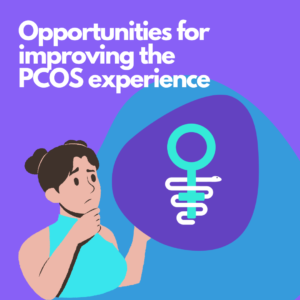
Did you know that approximately 75% of individuals with PCOS remain undiagnosed when visiting their doctor? Despite PCOS being the most common endocrine disease in women of reproductive age – we still don’t have standard diagnostic criteria.
The most recently endorsed criteria was established in 2003 (the Rotterdam criteria). The Rotterdam criteria requires the presence of at least two of the three criteria to diagnose PCOS in adults (irregular periods, hyperandrogenism – clinical or biochemical – and polycystic ovaries), after excluding other causes that could mimic PCOS. But one of the main hormones needed to test for hyperandrogenism is testosterone. And the common direct tests for testosterone show poor sensitivity in women, mainly because they were designed to measure testosterone in males.
The assessment of insulin resistance—which most women with PCOS experience—is another major problem for clinicians. Currently available measurement methods of insulin resistance are impractical in clinical practice.I n other words, the measurement methods may be accurate and sophisticated in a lab setting but are difficult to produce the same results in a doctor’s office.
For the women who are diagnosed with PCOS, few are satisfied with their diagnostic experience (only 35.2%according to a study published in the Journal of Clinical Endocrinology and Metabolism). Fewer (15.6%) were satisfiedwith the information they receive. Satisfaction with information received was positively associated with diagnosis satisfaction.
Women’s most common concerns were difficulty losing weight (53.6%), irregular menstrual cycles (50.8%), and infertility (44.5%).
These gaps in early diagnosis, education, and support are clear opportunities for improving the patient experience.
Just another reason why intervening earlier on in the lifecycle of women is so important. Are you a researcher or clinician working in the field of PCOS or a PCOS/ FemTech startup? We’d love to hear what you’re working on at : contact@femtechnology.org